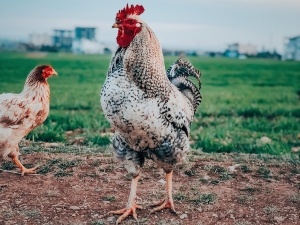
If your chicken starts exhibiting odd behavior you’d be right to be worried. A chicken illness can cause the bird to show very irregular and odd symptoms.
If your bird starts acting weirdly, if it starts to walk around in circles, then this article will be of help to you.
Table of Contents
Chicken spinning in circles:
A chicken spinning in circles is not normal behavior, only ill chickens do this. Birds that spin in circles either have Newcastle disease or encephalomalacia.
Newcastle disease:
Newcastle disease is a common chicken disease that can cause your bird to walk in circles. Other names for Newcastle disease include avian distemper, ND, fake flu, pseudo fowl, and parainfluenza.
This disease is caused by the paramyxovirus and is quite contagious.
The virus can be carried on clothing or on equipment contaminated by a sick bird.
A bird can also pass this disease in its droppings or secretions, these contaminated droppings or secretions will infect other birds and contaminate objects.
The virus can also survive in a bird’s feathers, on carcasses, in water, soil, litter, feed, and on eggs for several days.
Other signs of a bird having Newcastle disease include: a drop in egg production, sneezing, muscular tremors, coughing, lethargy, misshaped eggs, depression, green diarrhea, watery diarrhea, nasal discharge, huddling near heat sources, eventual complete paralysis, and even sudden death.
The type of Newcastle disease that causes birds to walk in circles is the type that attacks the bird’s nervous system.
What to do:
There is no treatment for this disease, but if the bird develops a secondary bacterial infection then the bacterial infection can be treated with antibiotics.
There are however ways to help a bird suffering from this condition.
Start off by isolating the sick bird, isolating the bird will give it the opportunity to heal in peace by itself. It will also keep curious birds from pecking at the sick bird, pecking is stressful to birds.
Give the bird its own food and water while in isolation. Also, make sure to give the birds foods that boost their immune systems. A strong immune system will help the bird eliminate pathogens that cause this disease.
If you can, you may need to take the ill bird to be properly examined, tested, and diagnosed by a vet, doing this will be helpful because the symptoms of this disease are similar to that of avian influenza.
Testing the bird will be the only way to really know what is going on.
Protect healthy birds:
Imposing good biosecurity measures will help keep other flock members from getting sick.
Good biosecurity measures entail cleaning tools and equipment, keeping rodents and wild birds away from your flock, and quarantining new birds for 24 hours to make sure that they are healthy.
Vaccinating healthy birds is also recommended. You’d need to vaccinate your birds before Newcastle disease affects your flock.
Encephalomalacia:
This is another disease that can cause birds to spin in circles, it is caused by a lack of vitamin E, and unlike other illnesses, it is not the result of a fungal, bacterial, or viral infection.
Signs that your bird has this disease, apart from it spinning in circles, include head shaking, tremors, convulsions, ataxia, falling on its back, twisting of the head, strongly stretched legs, a loss of balance, paralysis, and even death.
What to do:
Start off by isolating the sick bird, doing this will give the bird the opportunity to heal on its own in a stress-free environment.
Isolating the bird will also keep other birds from pecking at this bird out of curiosity. You can isolate the bird in a dog kennel or a cat carrier.
You’d need to check that your bird is eating feed that contains the correct amount of vitamin E for its age. You may also need to supplement added vitamin E into the bird’s diet.
Make sure that the supplements that you feed the bird are not past their expiry date
Taking the bird to the vet may be helpful as the vet will examine the bird, diagnose it, and suggest the appropriate supplements for your bird in particular.
The bird should recover fully as long as it hasn’t suffered permanent neurological damage.
Keep this from happening again in the future by giving your bird the correct supplements along with its food. Feed them vitamin E and selenium.
FAQ:
Why is my chicken’s head spinning:
If your pet’s head seems twisted or crooked, if it seems like the chicken’s head is spinning then your pet may have a case of wry neck.
This condition is caused by a genetic disorder, a head injury, ingesting toxins or it comes from a vitamin deficiency.
Other symptoms of this condition include difficulty standing, neck twists or the bird may seem like its always looking upward.
Signs of brain damage in chickens:
If you think that your pet has brain damage then look for these signs: falling backward, paralysis, ataxia, twisting of the head and neck, circling, and tremours.
If you see these symptoms in your pet the you’d need to take your bird to a vet and have it checked out.
If you enjoyed this article then you may also be interested in other chicken related articles. Here are some articles that you may be interested in: Sick Chicken Head Twitching, Chicken Hanging Head Down, How To Tell If A Chicken Has Internal Bleeding, Lime Vs Diatomaceous Earth For Chickens, Chicken Preening Or Itching

